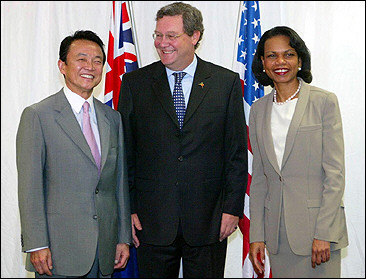China hit back at the United States on Tuesday for a White House national
security report that criticized the country's military buildup and
trade policies, saying the remarks were "groundless" and harmed relations.
"We ask the US side to stop releasing remarks that are harmful to the healthy
development of the Sino-US relations, to mutual understanding and to regional
peace, stability and development," Foreign Ministry spokesman Qin Gang said in
remarks carried by the Xinhua news agency.
China has made a "strong representation" against the United States over the
report and expressed its "strong dissatisfaction," Qin said.
He said China is a major force in safeguarding world peace and promoting
common development, and China has already decided its domestic and foreign
policies and development direction.
China carries out a national defense policy which is defensivein nature and
its limited national defense strength is targeted for self-defense, Qin said.
The White House security reports put China under closer scrutiny,
citing Beijing's military spending, trade and currency policies as nuisances in
growth of bilateral relations.
But analysts say raising complaints now may be part of a strategy of laying
the controversial issues on the table before Chinese President Hu Jintao's
inaugural trip to Washington late next month.

(L-R) Japanese Foreign
Minister Taro Aso, Australian Foreign Minister Alexander Downer and US
Secretary of State Condoleezza Rice pose for a photograph prior to their
trilateral talks in Sydney. The historic security talks concluded with
praise for China's engagement in the Asia-Pacific and an agreement to seek
greater cooperation within Asia. [AFP]
|
China was the focus at trilateral security
talks on Saturday between foreign ministers of the United States, Australia and
Japan, and was singled out in a White House report released last week that urged
reform of its trade policies and military transparency.
"It seems that now they've raised concerns and complaints, it could damage
the climate when President Hu pays his visit. But that's why Hu Jintao wants to
talk with his U.S. counterpart," said Professor Zhu Feng, an expert on
Chinese-U.S. relations at Peking University.
"It will magnify the necessity for both sides to maintain high-level
contacts," Reuters quoted him as saying.
U.S. Secretary of State Condoleezza Rice said in Australia and Indonesia last
week that China's military budget, which will rise 14.7percent this year to $35
billion, is a concern in relations. Washington is also pressuring Beijing to
revalue its yuan currency at a higher exchange rate, and allow more U.S. firms
to do business in China, one of the world’s biggest markets.
Two U.S. senators pushing for higher export tariffs unless China revalues the
yuan and U.S. Commerce Secretary Carlos Gutierrez are also due to visit Beijing
this week, Reuters reported.
But Washington may be reluctant to push too far as it tries to engage Beijing
on a series of multilateral issues, including Western efforts to curb Iran's
atomic ambitions and talks on North Korea's nuclear programs.
"This has
been the U.S. strategy toward China. On the one hand, economically, socially and
on the international stage, it tries to engage China," said Lai Hongyi, a
scholar at Singapore's East Asia Institute, in an interview with Reuters.
"But at the same time, on the military and national security front, the U.S.
is also making moves to hedge against China's military power."
Washington also risks alienating its regional allies if it pushes too far
with criticisms of China they may not agree with, analysts say.
While U.S. Secretary of State Condoleezza Rice was focusing on China's
military last week, Australia made it clear it sees China's rise as more of an
economic opportunity than a threat.
China's growing demand for raw materials such as grain and minerals that
Australia produces made the two increasingly closer trade partners, said David
Zweig, director of the Hong Kong-based Center on China's Transnational
Relations.
"I think the basic tone in Beijing is that we can only do what
we can," said Peking University's Zhu. "We can't sacrifice national interest
just for concern in the United States."